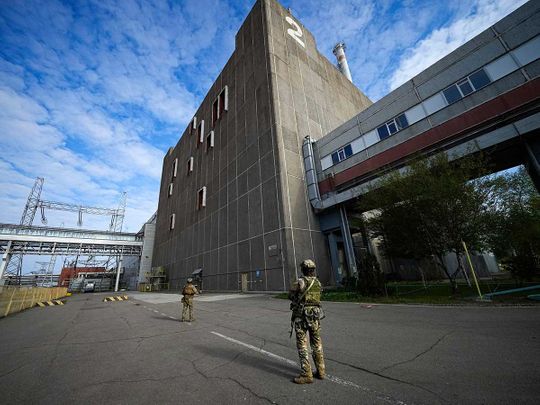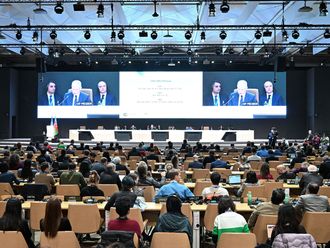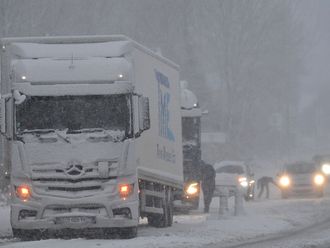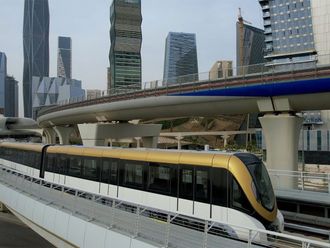
Kyiv: Moscow and Kyiv on Tuesday accused each other of risking catastrophe by shelling the Zaporizhzhia nuclear plant in southern Ukraine as they awaited a report by the United Nations nuclear watchdog on its condition.
The plant, which is operated by Ukrainian technicians, was captured by Russian forces in early March soon after they invaded Ukraine.
Russia and Ukraine have for weeks accused each other of endangering its safety - and that of Europe - by shelling the site and surrounding areas. But until now, no independent third party has been able to establish who has inflicted what damage on the plant.
It is unclear if that will change later on Tuesday when the United Nations’ International Atomic Energy Agency (IAEA) releases a report based on a fact-finding mission to the plant that is expected to detail damage.
IAEA chief Rafael Grossi led the mission last week and two IAEA staff remain on site monitoring the situation. Grossi is expected to brief the UN Security Council in New York on his findings later on Tuesday.
It is unclear however whether Grossi will attribute blame to either side.
Ukrainian President Volodymyr Zelenskiy on Monday warned of a near “radiation catastrophe” at the plant and said Russia’s shelling of it showed Moscow “does not care what the IAEA will say”.
He was speaking after IAEA officials, citing information supplied by Ukraine, said the sole remaining reactor had gone offline after the plant’s backup power line had been cut to extinguish a fire.
They said the line itself had not been damaged and would be reconnected and that the plant had enough electricity to operate safely. The reactor would be reconnected to the grid once backup power was restored.
Russia, which has questioned why it would shell its own forces who it says are guarding the plant, on Tuesday accused Ukrainian troops of bombarding the facility, Europe’s largest, a day earlier.
Russia’s diplomatic mission to international organisations in Vienna, where the IAEA is based, said on Telegram that three Ukrainian shells had landed near the plant’s fuel storage unit, solid radioactive waste storage and near one of the power units.
It published images of shell impacts to back its assertion.
Missile strikes
Ukrainian officials meanwhile said Russian forces had shelled Kharkiv, the country’s second city, and destroyed an apartment block in the centre. After overnight shelling of the city, which is close to the Russian border, rescue workers had found the body of a woman beneath the rubble, mayor Ihor Terekhov said.
Three people, including the woman, had been killed as a result of Russian rocket fire in the Kharkiv region over the past day, the region’s governor said.
Ukrainian officials said Russia had also struck an oil depot in the town of Kryvy Rih, President’s Zelenskiy’s hometown.
“There’s a big fire at the oil depot. Fire services are working at the site. We’re working to establish the scale of destruction and information about casualties,” Valentyn Reznychenko, a local regional official said.
There was no significant update on Ukraine’s counter-offensive in the south of the country after it said a day earlier that its forces had retaken several towns.
Russian President Vladimir Putin was meanwhile shown with his defence minister as he inspected a big military exercise in Russia’s Far East, thousands of miles from the war in Ukraine.
The New York Times reported that US intelligence had assessed that Russia was buying artillery ammunition from North Korea as sanctions begin to reduce its ability to sustain its operations in Ukraine.
There was no immediate reaction to that from Moscow.
Ukraine’s general staff accused Russian forces of endangering kindergartens, places of worship and a field hospital by placing personnel and military equipment in and around those buildings.
There was no response from Russia, which has accused Ukraine of doing the same thing. Reuters was unable to independently verify the battlefield reports.
Energy crisis
Fears in Europe persisted over a potentially bleak winter for consumers and businesses after European gas prices soared a day earlier as Russia kept its main gas pipeline to Germany shut.
Russia blames disruption on equipment repairs and maintenance caused by Western sanctions for its halt to the flow of gas through Nord Stream 1, its main pipeline to Germany. Some European politicians say that is nonsense and that Moscow is using energy as a geopolitical weapon, something Russia denies.
Russia was due to reopen the pipeline on Saturday but now says an oil leak has forced it to shut indefinitely.
Pipeline operator Gazprom’s deputy chief executive officer, Vitaly Markelov, told Reuters on Tuesday that Nord Stream 1 would not resume shipments until Siemens Energy repaired faulty equipment.
Siemens said it did not understand Gazprom’s representation of the situation.
Russian foreign ministry spokeswoman Maria Zakharova blamed the United States for the energy crisis. She said it had pushed European leaders towards what she called the “suicidal” step of cutting economic and energy cooperation with Moscow.












